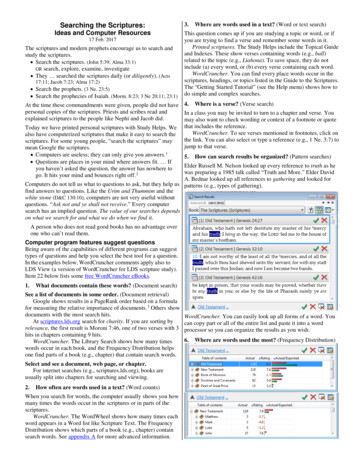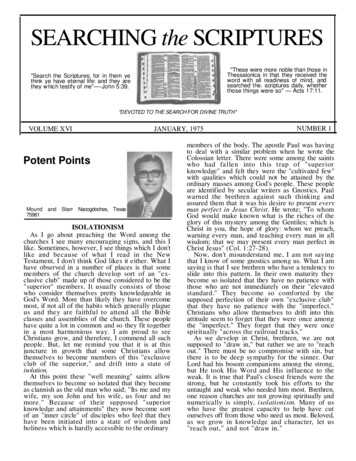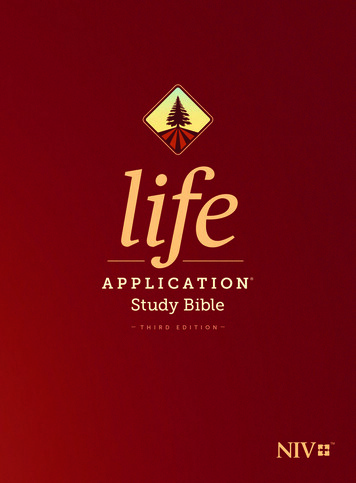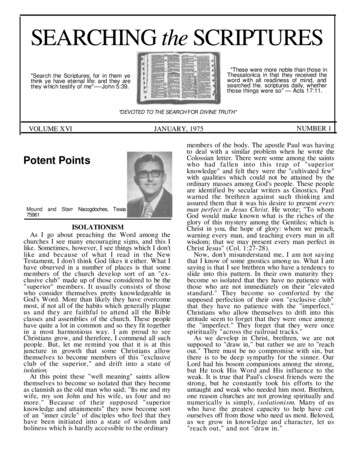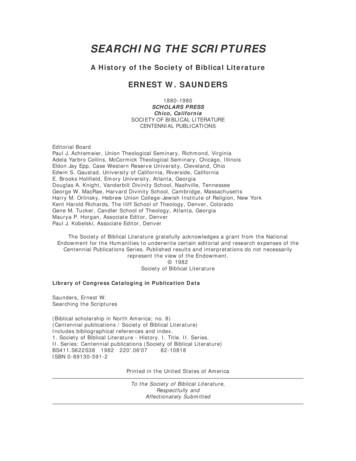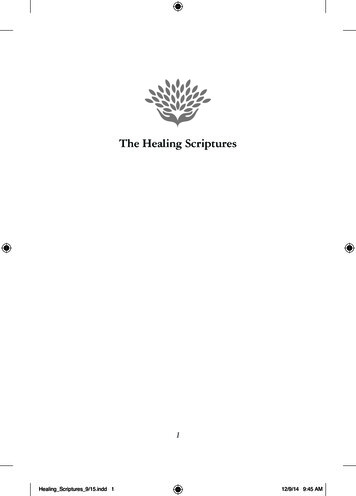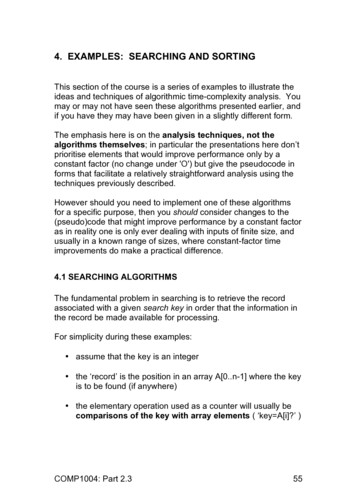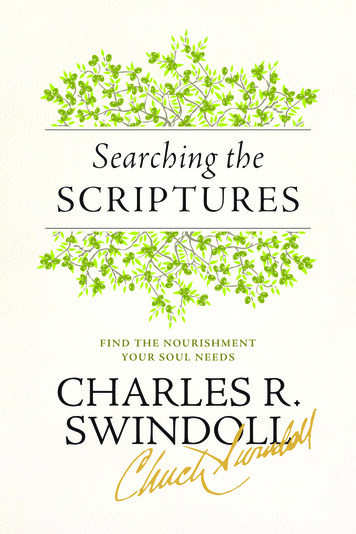
Transcription
Searching the Scriptures
Searching theSC RIPTURESFIND THE NOURISHMENTYO U R S O U L N E E D SCHARLES R.SWINDOLLTyndale House Publishers, Inc.Carol Stream, Illinois
Visit Tyndale online at www.tyndale.com.TYNDALE and Tyndale’s quill logo are registered trademarks of Tyndale House Publishers, Inc.Searching the Scriptures: Find the Nourishment Your Soul NeedsCopyright 2016 by Charles Swindoll. All rights reserved.Cover illustration of olive branches copyright cookamoto/Adobe Stock. All rights reserved.Author photograph taken by Edmonson Photography, copyright 2009. All rights reserved.Designed by Ron KaufmannEdited by Stephanie RischePublished in association with Yates & Yates, LLP (www.yates2.com).Unless otherwise indicated, all Scripture quotations are taken from the Holy Bible, New LivingTranslation, copyright 1996, 2004, 2015 by Tyndale House Foundation. Used by permission ofTyndale House Publishers, Inc., Carol Stream, Illinois 60188. All rights reserved.Scripture quotations marked NASB are taken from the New American Standard Bible, copyright 1960, 1962, 1963, 1968, 1971, 1972, 1973, 1975, 1977, 1995 by The Lockman Foundation. Usedby permission.Scripture quotations marked NKJV are taken from the New King James Version, copyright 1982by Thomas Nelson, Inc. Used by permission. All rights reserved.Scripture quotations marked KJV are taken from the Holy Bible, King James Version.Scripture quotations marked MSG are taken from THE MESSAGE by Eugene H. Peterson,copyright 1993, 1994, 1995, 1996, 2000, 2001, 2002. Used by permission of NavPressPublishing Group. All rights reserved.Scripture quotations marked NIV are taken from the Holy Bible, New International Version, NIV. Copyright 1973, 1978, 1984, 2011 by Biblica, Inc. Used by permission. All rights reservedworldwide.Quotations designated NET are from the NET Bible, copyright 1996–2006 by Biblical StudiesPress, L.L.C. http://netbible.com. All rights reserved.Library of Congress Cataloging-in-Publication DataNames: Swindoll, Charles R., author.Title: Searching the scriptures : find the nourishment your soul needs / Charles R. Swindoll.Description: Carol Stream, IL : Tyndale House Publishers, Inc., 2016. Includes bibliographicalreferences.Identifiers: LCCN 2016021428 ISBN 9781414380650 (hc)Subjects: LCSH: Bible—Hermeneutics.Classification: LCC BS476 .S95 2016 DDC 220.6—dc23 LC record available athttps://lccn.loc.gov/2016021428Printed in the United States of America227216205194183172161
CONTENTSIntroduction: A Testimony from the Chef IXS ta g e O n e F i n d i n g t h e F oo dC h a p t e r 1 S u rv e y i n g t h e S h e lv e s 3Understanding the Basic Story of the BibleChapter 2 Considering True Nourishment 23Discovering the Transforming Nature of the BibleS ta g e T w o P r e pa r i n g t h e M e a lChapter 3 Choosing the Recipe 51Pursuing the Treasures of ScriptureChapter 4 Reading the Ingredients 79Observing the TextC h a p t e r 5 U n d e r s ta n d i n g t h e N u t r i e n t s 1 0 7Interpreting the TextC h a p t e r 6 C o m pa r i n g t h e F l avo r s 1 3 5Correlating the TextChapter 7 Adding the Spices 159Applying the TextS ta g e T h r e e S e rv i n g t h e F e a s tChapter 8 Setting the Table 187Preparing to Dig into God’s Word
Chapter 9 Tasting a Sample 209Learning Where We Fit in the StoryC h a p t e r 1 0 F e e d i n g t h e H u n g ry 2 3 1Presenting the TruthA Final Word: Bon Appétit 249Providing Nourishing Meals for Yourself and OthersAbout the Author 253Notes 255
INTRODUCTIONA Testimony from the ChefFor more than sixty years I have cultivated a love for the Bibleand have pursued an understanding of it. My purpose in writingthis book is to help you do the same.First, I’d like to offer an explanation of how this love affairstarted. As early as my late teens, I was drawn to the truths ofGod’s Word and captivated by its wisdom. My interest in the Biblecan be traced in large part to the fact that I was reared by a motherand a father who believed in God and respected the Scriptures.They used the Bible’s counsel as a guideline for our home, oftenquoting from its pages as my older brother, Orville; my older sister,Luci; and I were growing up. It was back then that the Bible firstbegan to make sense to me.Because scriptural truth served as our domestic foundation, ourswas a home where respect for authority was expected and lovinglyenforced. At the same time, my parents allowed for open discussionand gave us the freedom to speak our minds. Disagreements in ourhome didn’t fester and lead to unending arguments; rather, theywere resolved quickly and correctly, just as the Bible teaches. Ourswas not an uptight, frowning family marked by harsh demands ormindless rules and regulations. On the contrary, while my parentsix
I n t ro d u c t i o nhonored, taught, and respected the Bible, they also encouragedlighthearted fun. In our home, laughter was loud and frequent, andthe sounds of music— both vocal and instrumental— were heardevery day. In that happy, balanced setting, I never felt abused orexploited by overbearing, obsessive parents who hammered us children with a long list of legalistic requirements underscored by Bibleverses yanked out of context. On the contrary, grace flowed oftenand freely.Having grown up in that type of environment, I was interestedin cultivating a relationship with a woman who had standardssimilar to mine. I longed to find a life partner who loved the Lordand His Word; who found delight in free- flowing, in- depth conversation; who enjoyed music, lots of good humor, and laughter;and who was committed to deepening her knowledge of scripturaltruth. When Cynthia and I met, I quickly realized that she wasthe one, which led to our being engaged— in one week(!)— andmarrying eighteen months later. Throughout our courtship, wefound a mutual interest in digging into the Scriptures. We regularlyattended Bible studies together in order to establish our home onthe rock- solid foundation of the Bible.Less than two years after we married, my hitch in the MarineCorps resulted in my spending more than sixteen months apartfrom my wife on the Japanese island of Okinawa. Even there,I intensified my study of the Bible. Thanks to a man namedBob Newkirk, a representative of the Navigators serving on theisland, I dug deeper into my understanding of God’s Word, whichincluded an extensive Scripture- memory program and a weeklyBible study with others who were serving in various branches of themilitary. As a result, it became clear to me that I should pursue aneven deeper study of Scripture at a seminary, with a view towardentering full- time ministry.This calling came as an unexpected surprise to me since itx
CHARLES R. SWINDOLLrepresented a complete change of direction in my career. Cynthiawas delighted with the decision. Within weeks after my dischargefrom the Marine Corps, in the summer of 1959, we were on ourway to Dallas Theological Seminary (DTS). We towed a small U- Haul trailer full of our belongings, smiling from ear to ear aswe anticipated the excitement of learning and growing together.I cannot describe the sheer delight within me, knowing that mylove for God would be enlarged and deepened, my mind wouldbe stretched and challenged as never before, and my hunger for adeeper understanding of the Scriptures would begin to be satisfied.The next four years were nothing short of life changing.It was during that time that I became acquainted with Dr.Howard G. Hendricks, who was the professor for my major andchair of the Department of Christian Education. While I tookevery subject he taught during those years of study, the one thatproved most beneficial was his best- known course, at the timetitled Bible Study Methods. Even though I had been a student ofthe Bible since my late- teen years, I began to realize how incomplete and inadequate my approach to the Scriptures had been.Though I had slowly grown in my knowledge of God’s Word overthe previous years, I didn’t have a consistent method of studying those truths and interpreting them— one that would leadto insightful and accurate applications of the Scriptures. WhileI had been sincere and committed during those earlier years, mymethod of searching the Scriptures lacked a systematic, trust worthyapproach. Thanks to what I learned in this magnificent courseof study from “Prof ” Hendricks at Dallas Theological Seminary,I finally discovered how to engage in a meaningful and reliableprocess of searching the Scriptures.When my wife witnessed my excitement as I shared those principles with her, she invited Dr. Hendricks to teach them to thespouses of the seminary students as well. She organized a wives’xi
I n t ro d u c t i o nfellowship that gathered one evening each week, during which hetaught them the same techniques he’d been teaching us. A contagious spirit of excitement swept across our campus as husbands andwives were involved in their own study of the Bible, many of themfor the first time in their married lives.The principles Cynthia and I learned in my early years of studyat DTS are the same principles I have used since entering the ministry in 1963. Not a week passes without my returning to those tried- and- true guidelines I imbibed decades ago. To this day, I havenot delivered a sermon, conducted a teaching session, released abroadcast or podcast, or given even a brief devotional without firstputting those principles to use.For me, opening up God’s Word became like a banquet feast.What I learned from Prof Hendricks became nourishment for mysoul. Because these principles have served me so well for more thanfifty years of ministry, I want to pass them on to others—includingyou— on the pages of this book. As a result of your learning themand putting them into practice, you, too, can know the fulfillment of opening the pages of your Bible without feeling fearful orintimidated. You, too, can share confidently with others what youglean from your study of the Scriptures. If you are a minister of thegospel, an evangelist, a missionary, or one who teaches God’s Wordin any other capacity, you can be certain that what you are communicating is in keeping with what God has written. You can experience the joy of personal discovery, as well as the great satisfactionof helping others gain an understanding of God’s truth.The process of getting these principles into your head andheart is like passing a baton in a relay. Years ago I was handed thesemagnificent insights from one who modeled them, and it is nowmy delight to pass the baton from my hand to yours. This relayhas been going on for centuries. The aging missionary Paul wrotethese words to Timothy, his younger friend who was shepherdingxii
CHARLES R. SWINDOLLa church in ancient Ephesus: “Now teach these truths to othertrustworthy people who will be able to pass them on to others”(2 Timothy 2:2). By the time you finish reading these pages, youwill be well equipped to search the Scriptures on your own andwell prepared to pass on the baton to others with great joy andquiet confidence.Before we begin, I need to express my profound gratitude tomy very capable colleague and keen- eyed editor, Rhome Dyck. Hehas faithfully worked alongside me from the starting blocks to thefinish line. His creative mind and skillful hands have been of inestimable value in assisting me as we have honed ideas, shaped thosethoughts into words, carefully planned the interior design, andthen pulled everything together to create this book. My gratitudefor this gifted man knows no bounds.Chuck SwindollFrisco, Texasxiii
S ta g e O n eFinding the Food
Chapter 1SURVEYING THE SHELVESUnderstanding the Basic Story of the BiblePeople are frustrated. Maybe you are one of them.Here’s the deal. You pick up a Bible, and you’ve got this big, thickbook with thin pages and tiny print. You’ve been told that it’s the all- time bestseller, that thousands— more like millions— of peoplehave had their lives changed or their marriages transformed by whatis written there. But as hard as you try, you still can’t make heads ortails of any of it! Others may have been helped and comforted, butyou’re stumped. As a matter of fact, you’re completely confused. Asmuch as you want to understand all this, none of it makes sense.What’s wrong? What’s missing? Even though you are fairlyintelligent and are dedicated to going deeper with God’s Word,why can’t you get excited about it?If the Bible were a gourmet meal, you’d certainly find yourselfstarving to death. Just as you need to know your way around thekitchen if you want to learn to cook, you need to know the basic3
S u rve y i n g t he S helvesstructure of the Bible and the main staples of the nourishment it provides. You’ll also want to discover some of the unique flavors God’sWord offers. That’s what we’ll try to do in this chapter. We’ll first lookat how the Bible is put together. Then we’ll discover why we shouldtake time to study it and learn what it can teach us. By breakingScripture down into smaller sections, we’ll get a better handle on whatGod is saying to us. Along the way, we will also begin to see the consistency, importance, and beauty of God’s message. So let’s get started!AN OVERVIEW OF THE BIBLEThe first thing we need to know is that the Bible includes a total of sixty- six individual books. Some of these books are personal letters,some are songs, and others are like journals or diaries; and then thereare law codes and histories. The words of the Bible were breathedby God and recorded by approximately forty human authors over aperiod of approximately 1,500 years. As Paul explains to his protégéTimothy, “All Scripture is inspired by God and is useful to teachus what is true and to make us realize what is wrong in our lives. Itcorrects us when we are wrong and teaches us to do what is right”(2 Timothy 3:16).The Bible is divided into two major sections: the OldTestament, which anticipates the coming of Jesus, the Messiah;and the New Testament, which presents Jesus as the Messiah andexplains His ministry and purpose.One surprising aspect of Scripture is that the books don’t appearin chronological order. No wonder so many people are frustratedwhen they try to understand the Bible!It’s helpful to remember this: the Bible is put together much likea newspaper. Think of the way a newspaper is laid out. All the newsstories are placed in one section, the sports reports and statistics areput in another section, the business or lifestyle stories are groupedtogether in yet another section, and the want ads are in another.4
CHARLES R. SWINDOLLLikewise, in the Bible, the Old Testament begins with the books ofancient history— from Genesis to Esther. Following that section, thebooks of poetry appear together— from Job to Song of Solomon.Finally, in the last part of the Old Testament, we come to the booksof prophecy— from Isaiah to Malachi. These three major sectionsrepresenting three types of literature comprise the thirty- nine booksof the Old Testament. The New Testament is set up in a similar way.The Gospels include the books of Matthew, Mark, Luke, and Johnand tell the Good News of Jesus’ life, death, and resurrection. Actsis a book of history, and it covers the establishment of the church.Then come all the letters, which are usually divided into the letters ofPaul (Romans through Philemon), and the general letters (Hebrewsthrough Jude). Finally there’s Revelation, which is a book of prophecy.As we begin our brief journey through Scripture, we are ableto see that God’s Word wasn’t designed to be just a pretty booksitting on a coffee table. Rather, we might think of the Bible as adelicious meal— in fact, as a feast meant to be enjoyed and savored.Each time we are hungry deep in our souls, we need to return tothe Scriptures for our spiritual sustenance. Interestingly, the morewe learn and grow from searching the Scriptures on our own, thebetter equipped we will be to teach others those tasty truths.TYPES OF BOOKS IN THE BIBLEThe Old TestamentThe New TestamentBooks of HistoryGenesis–EstherThe GospelsMatthew–JohnBooks of PoetryJob–Song of SolomonBook of HistoryActsBooks of ProphecyIsaiah–MalachiThe LettersRomans–JudeBook of ProphecyRevelation5
S u rve y i n g t he S helvesTHE OLD TESTAMENTThe Books of HistoryThe first course of our literary banquet is served to us in the first section of the Old Testament. Often this historical section of Scriptureis called narrative because God is communicating His Word as agrand story. However, since the first five books of the Bible containthe Ten Commandments and the laws for Israel to follow, they aremost frequently referred to as the Law. The story begins in Genesis 1with God creating all things. The crown jewel of His creation? Youguessed it: Adam and Eve, who bore their Creator’s image. Living inperfect communion with God, Adam and Eve were given the opportunity to obey their Creator. But barely into the story, in Genesis 3,they rebelled against and disobeyed God’s command. Their sin fractured their relationship with their holy God.From this point on in Scripture, we witness again and again thehorrific results of sin. At the same time, we observe the grace andforgiveness of God, who carefully unfolds His plan to redeem Hiscreation. In Genesis 12, God chooses Abram (who later becomesAbraham) and his wife, Sarai (Sarah), to be the parents of a specialnation. Eventually this nation becomes known as Israel. ThroughAbraham and his offspring, all the families of the earth will beblessed. What an important and wonderful promise!The rest of Genesis tells the fascinating stories of Abraham andthe next three generations. Over time they grew into a large family and wound up in Egypt because of a famine. With a flip of thepage, the book of Exodus continues the story four hundred yearslater, with Abraham’s family having been blessed by God and having grown into a nation made up of twelve tribes. Fearing theirpotential power, the Egyptians enslaved the Israelites. When theIsraelites cried out to God for relief from unfair and excruciatinglabor, He responded by raising up Moses to deliver His peoplefrom Egypt and to bring them to His special Promised Land.6
CHARLES R. SWINDOLLThe narrative continues, and on the way to the Promised Land,God gave the Israelites His law to follow and live by. These codesexplain how God’s people are to enjoy a loving relationship withHim and each other. When the twelve tribes finally arrived at thedoorstep of the Promised Land, however, they ultimately didn’ttrust God to deliver them. The Promised Land was occupied by theformidable Canaanites, whom the Israelites assumed were impossible to conquer. Fear eclipsed faith. Consequently, that unbelieving generation was left to die off as they wandered in the desert forforty long years. Much of that wandering is covered in the last partof Exodus and through the book of Numbers.The book of Deuteronomy is actually a message to the grownchildren of the unbelieving generation that died in the desert. Godcalled Moses to repeat and underscore His laws to this new generation. The challenge to know and teach God’s Word is clear:These are the commands, decrees, and regulations that theLord your God commanded me to teach you. You mustobey them in the land you are about to enter and occupy,and you and your children and grandchildren must fearthe Lord your God as long as you live. If you obey all hisdecrees and commands, you will enjoy a long life. Listenclosely, Israel, and be careful to obey. Then all will go wellwith you, and you will have many children in the landflowing with milk and honey, just as the Lord, the God ofyour ancestors, promised you.Listen, O Israel! The Lord is our God, the Lord alone.And you must love the Lord your God with all your heart,all your soul, and all your strength. And you must commityourselves wholeheartedly to these commands that I amgiving you today. Repeat them again and again to yourchildren. Talk about them when you are at home and when7
S u rve y i n g t he S helvesyou are on the road, when you are going to bed and whenyou are getting up. Tie them to your hands and wear themon your forehead as reminders. Write them on the doorpostsof your house and on your gates.Deuteronomy 6:1-9Notice from those words that Moses was charged with teaching theIsraelites to obey God’s Word. Also note that learning God’s Wordcreates results— in this case, obedience. Furthermore, God told thepeople that obedience would allow them to enjoy a long life. Thesefirst few sentences of Deuteronomy 6 are saying, in summary, thatobedience to God’s Word results in God’s blessing.However, obeying God isn’t automatic; it isn’t accomplished bysimply knowing His instruction. We learn here that wholeheartedlyloving our great God includes teaching and explaining His Wordto others. So what is the point God is communicating here? Thatparents have the responsibility to teach and remind their childrenof God’s truths. This ancient command is to be obeyed today, justas when it was first given. Generation after generation is to learn,obey, and teach the truths of the Lord. Timeless passages like thisapply to all generations— including our own.This is a good time to point out that the study of God’s Wordis for everyone. While there is a specific role for the pastor- teacher,God doesn’t limit the explanation of His Word to certain specialists. Rather, God’s Word is to be learned, applied, obeyed, andpassed on and on and on. Everyday people, including parents whoteach their kids, are all part of His plan. Searching the Scripturesisn’t restricted to any specialized group— the Scriptures are accessible to anyone and everyone.By the way, the diligent study of God’s Word isn’t mentionedonly in the book of Deuteronomy. It’s a theme you’ll find repeatedthroughout the Bible.8
CHARLES R. SWINDOLLNow let’s get back to the biblical story. The grand narrative progresses as God leads the new generation to conquer the PromisedLand under Joshua’s leadership. But sadly, once the twelve tribessettled in the land, they struggled to faithfully obey their God. Thatled to a period when Israel was ruled by judges whom God raisedup. God would deliver His people from their enemies only to havethe people repeatedly fall into sin again. It was a wicked, tragic cycle!Eventually, out of rebellion against God, the people asked God fora human king so they could be like the pagan nations around them.He gave them their request, but they lived to regret it.The Books of PoetryThe next part of the Bible’s story takes us into the beginning of thekingdom of Israel, first under King Saul, then King David, andfinally King Solomon. This collection of books is sometimes calledwisdom literature, because it was written to impart God’s wisdom tothose who believe and obey God’s Word.The book of Proverbs is one of the books of poetry in the OldTestament. Written and collected mostly by Solomon, Proverbsexplains and extols wise behavior in the eyes of the Lord. Considerthe beginning of chapter 2:My child, listen to what I say,and treasure my commands.Tune your ears to wisdom,and concentrate on understanding.Cry out for insight,and ask for understanding.Search for them as you would for silver;seek them like hidden treasures.Then you will understand what it means to fear the Lord,and you will gain knowledge of God.9
S u rve y i n g t he S helvesFor the Lord grants wisdom!From his mouth come knowledge and understanding.He grants a treasure of common sense to the honest.He is a shield to those who walk with integrity.He guards the paths of the justand protects those who are faithful to him.Then you will understand what is right, just, and fair,and you will find the right way to go.Proverbs 2:1-9In this passage, God is reminding us to hear and study and obeyHis instructions. Notice the diligence involved in the study ofGod’s Word: we are to search for it as one would search for hidden treasure. I can vividly remember the determination and diligence with which I dug into the pages of the Bible when Igot serious about my faith while serving in the Marines on theisland of Okinawa. What treasures I found as I searched theScriptures! I dug even deeper when I went to seminary.Proverbs 2 explains what is gained from the study of Scripture:wisdom to find the right course of action for one’s life. The Bible, asGod’s inerrant Word, gives us the insight we need. This is why peoplewho have learned to study the Scriptures are some of the most joyful,peaceful people on the planet. It takes some effort to learn how toconsistently draw truth from the Bible, but it is well worth the effort.As we get into the process involved in searching the Scriptures later inthis book, you will discover how beneficial such study can be.The Books of ProphecyGod’s persistent call to study His Word isn’t always given as a positive command. Sometimes He confronts His people with the sin ofignoring Him and His commands. This is often seen in the books10
CHARLES R. SWINDOLLof the prophets, which are contained in the third and final section of the Old Testament. Those prophets were a strong- hearted, tough- minded bunch!KINGS OF ISRAELThe United KingdomSaulDavidSolomonThe Divided KingdomKings of ramAhaziah/JehoahazAthaliah oniahZedekiahKings of IsraelJeroboam ehuJehoahazJoash/JehoashJeroboam IIZechariahShallumMenahemPekahiahPekahHosheaThe books from Isaiah to Daniel make up the five Major Prophetsin the Old Testament. They are called Major Prophets simply11
S u rve y i n g t he S helvesbecause their writings are longer. Then there are twelve MinorProphets who wrote shorter books: Hosea through Malachi. Aprophet’s job was to speak for God. He communicated God’s clear,firm, and often confrontational message to direct the reigning kingand the people in the ways of the Lord. In one sense, this was thehighest office in the land of Israel— even more important than theking. However, the prophets were often ignored, mocked, ridiculed, and even put to death by the kings or the people.After the first three kings of Israel (Saul, David, and Solomon),the kingdom split over the issue of taxes. The northern ten tribesunited and kept the name Israel. The southern two tribes joinedforces under the name Judah. This period of the divided kingdomlasted until the end of the Old Testament. (Note that it’s always agood idea to pay close attention when reading in 1 and 2 Kings and1 and 2 Chronicles, as sometimes the writer is addressing events inthe northern kingdom and other times, the southern kingdom.)Each kingdom had its own kings. God raised up prophets during this time to speak to the kings and the people. Here are threesimple points to remember about the role of a prophet: Asa mouthpiece for God, prophets were primarily concerned with restoring the relationship between God andHis people. Prophetsconstantly called for repentance and warned ofimpending judgment. Prophetsoffered a message of hope as they foretold of afuture when God would restore His people.Despite the warnings from the prophets, however, no less thantwenty successive kings ignored the word of the Lord, and judgment came for the northern ten tribes. In 722 BC, the powerful12
CHARLES R. SWINDOLLnation of Assyria attacked and captured the kingdom of Israel andintegrated the nation into its own wicked empire.KEY DATES IN ISRAEL’S HISTORY931BC722BC586BC4BC931 BC The kingdom divides after Solomon’s death.722 BC Assyria captures and exiles the northern kingdom (Israel).586 BC Babylon destroys Jerusalem and exiles the southern kingdom (Judah) for seventy years.4 BC (?) Jesus is born in Bethlehem.The southern kingdom didn’t fare much better. The nation hadan occasional righteous king, but for the most part, it, too, wasmarked by disobedience. Approximately 150 years after the northern kingdom fell to Assyria, the southern kingdom was attackedby Babylon and taken into exile in 586 BC. Like the Assyrians,the Babylonians were a ruthless, cutthroat people. They destroyedeverything in their way, including the capital city of Jerusalem, itswalls, and the Temple that Solomon had built for God.The prophet Jeremiah lived in the tumultuous days leadingup to Judah’s Babylonian exile. God’s message through him isan example of a judgment from the Lord that was typical of theprophets. The Lord’s words were sharp, as His people continuedto ignore Him:“My people are foolishand do not know me,” says the Lord.“They are stupid childrenwho have no understanding.They are clever enough at doing wrong,but they have no idea how to do right!”Jeremiah 4:2213
S u rve y i n g t he S helvesHow’s that for telling it like it is? God’s prophets didn’t hold back;they declared truth without fear.This judgment against disobedience serves as an importantreminder to all people, including us today. God has made Himselfknown through His Book, the Bible. We are foolish if we don’tmake a careful study of His Word. Here’s a good motto to remember: no study, no stability. There is no shortcut to maturity. Itcomes slowly but surely to those who search the Scriptures.The disobedience of the people of Judah ultimately led to theirexile in Babylon. However, God wasn’t silent. He continued toraise up various prophets such as Daniel and Ezekiel to call thepeople to repent of their sins. Those prophets also predicted a coming Messiah, who would ultimately save Israel from their sin.After seventy grueling, lonely years of captivity, the PersianEmpire under King Cyrus conquered the Babylonian Empire andlet the captives return to their homeland. But many captives hadbecome comfortable in Babylon and Persia
will be well equipped to search the Scriptures on your own and well prepared to pass on the baton to others with great joy and quiet confidence. Before we begin, I need to express my profound gratitude to my very capable colleague and keen-eyed editor, Rhome Dyck. He has faithfully worked alongside me from the starting blocks to the finish line.File Size: 1MBPage Count: 36

